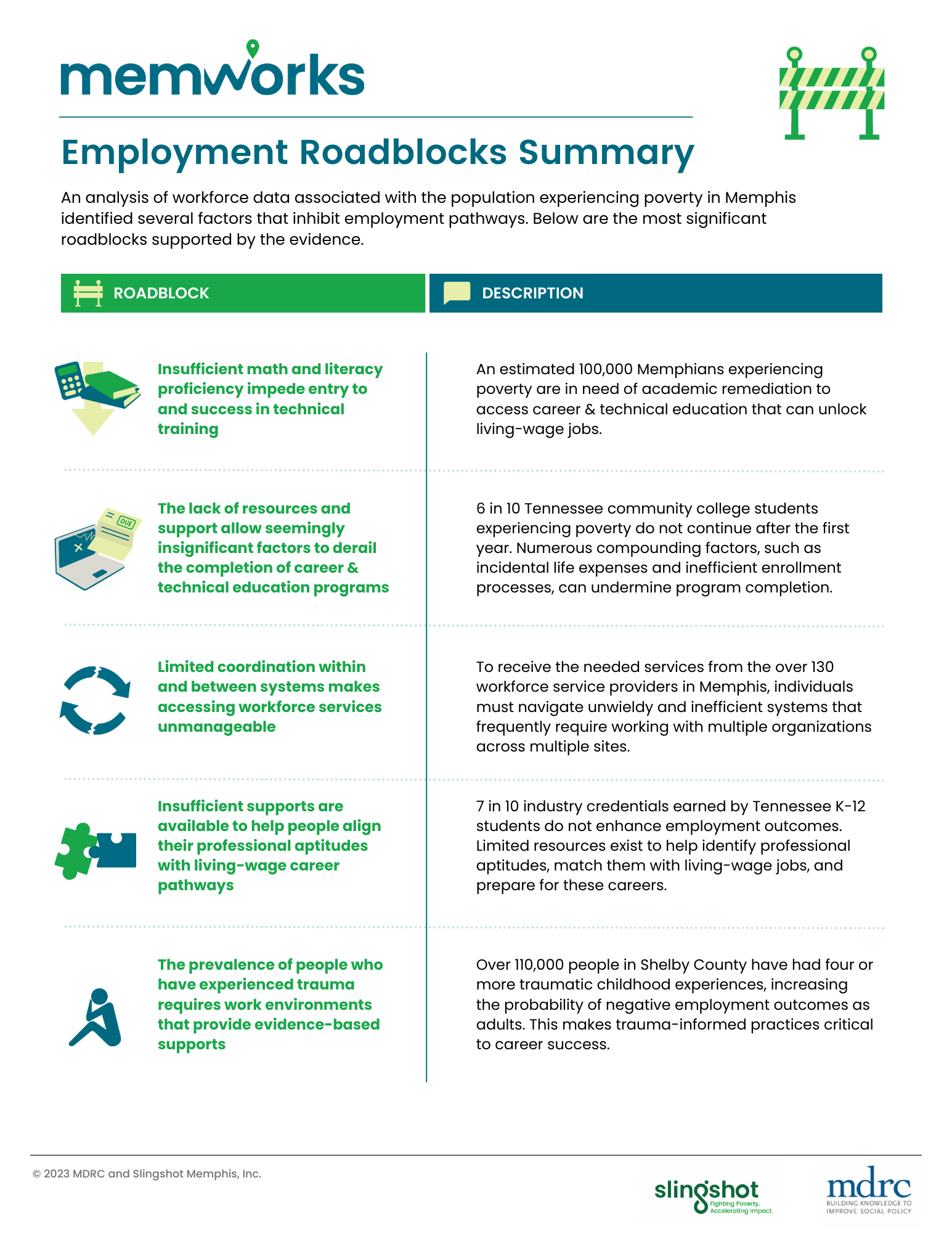Employment Roadblocks
An analysis of workforce data associated with the population experiencing poverty in Memphis identified several factors that inhibit employment pathways. Below are the most significant roadblocks supported by the evidence.

Academic remediation

Post-secondary attainment

Uncoordinated Systems

Aptitude Alignment

Trauma

Childcare

Transportation

Health

Basic Needs

Uncoordinated Policies
Employment myths
An analysis of workforce data identified a lack of evidence to support several common perceptions about employment in Memphis. Below are several employment myths for the population experiencing poverty:
- MYTH
- FACT
- Living-wage jobs can be easily obtained with a high school diploma
8 in 10 high school graduates do not demonstrate readiness for post-secondary education or a career. In Memphis, a high school diploma does not ensure sufficient math and reading proficiency to enable the pursuit of training needed to obtain living-wage jobs.
- Financial assistance for tuition is enough to earn a post-secondary degree
Only 1 in 5 tnAchieves scholarship recipients in Shelby County graduate within three years. While financial assistance for tuition is valuable, numerous incidental expenses can undermine the benefits of tuition support.
- Professional credentials always improve employment outcomes and earning potential
Only 30 percent of industry credentials earned by Tennessee K-12 students are associated with jobs that pay at least $15 per hour. Credentials are not helpful when they are not aligned with high-wage, high-demand jobs.
- Anyone who wants to work can access the services needed to find a living-wage job
The rate of people experiencing poverty who are not working but seeking employment is 50 percent higher in Memphis than Tennessee. Identifying the needed workforce services in accessible locations is frequently insurmountable.
- Enhancing public transit will solve the transpiration gap for employment
Only 1 percent of neighborhoods in Memphis are considered location efficient, i.e. compact, close to jobs and services, with a variety of transportation choices. Greater investments in public transit alone is not sufficient.
Population Snapshot
Demographic data was analyzed to provide an objective understanding of the population experiencing poverty in Memphis to help inform why employment pathways are not working.
Insufficient math and literacy proficiency impede entry to and success in technical training
An estimated 100,000 Memphians experiencing poverty are in need of academic remediation to access career & technical education that can unlock living-wage jobs.
- 60 percent of people experiencing poverty are in need of academic remediation
- 25 percent of people experiencing poverty lack a high school diploma or equivalent
- 2 out of every 10 high school freshmen do not receive a diploma within 4 years
- 80 percent of high school graduates do not demonstrate readiness for post-secondary education and/or career
- Over 90 percent of first-time freshmen at Southwest Tennessee Community College qualified for learning support
- Less than 15 organizations in Memphis have been identified that enable adults to earn a high school diploma or equivalent
- Lack of education/training was the second highest obstacle to employment cited in a survey of TANF recipients conducted by the University of Memphis (GROWWTH)
- Percent of community college freshmen who qualified for learning support (2016 cohort)

“We had to administer a literacy test in our application process because a high school diploma was not sufficient to know if candidates could comprehend the training manuals.”
Robert Montague,
Executive Director, Tech901

Stay updated


